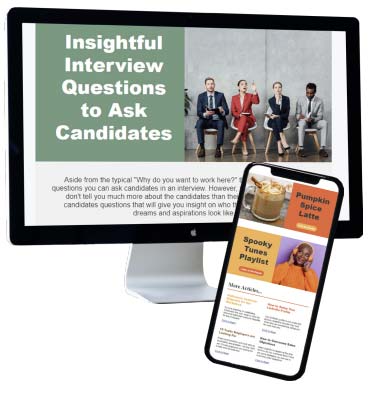Before You Go!
Sign up for our newsletter - which features professional templates, job market updates, articles, playlists, recipes, and more, sent directly to your inbox!


You can find the second part of this series in the following post, How To Leave the Right Voice Mail - Replacing the Obvious
By Shawna Schuh
You're with a customer. Nothing irks me more when I'm working with someone who can't resist his or her ringing phone. That is downright discourteous to me–and to their caller. If I've gone out of my way to arrange to meet with you, I deserve your undivided attention. I feel unimportant and disregarded if the phone is more important than my presence.
I can just hear you say, 'But I might lose some business if I don't answer.'? That could be true, but if you pick up while you're in an active appointment with someone, you can lose that business or make a really bad impression. Even if you do buy something or enlist your services that day because I'm there, answering your phone could cost you my loyalty and respect. If you are with me, then please be with me 100%.
You've schedule a set time to work on your project. When you have set a goal, don't treat your ringing phone like it is an emergency. Check your messages after you have completed what you set out to do during a specified time period. Your callers are bound to get a better response from you because you can focus on them when you do return their calls–and because you feel good about what you've just accomplished.
You are in a meeting. Taking calls during a meeting is downright rude. Of course, there could be an exception to this–your wife is giving birth or there is a real medical emergency that needs your attention. Other meeting attendees are certain to understand in special cases. Otherwise, they deserve your undivided respect and attention. If there is an important call coming in and you know it, alert those in the meeting ahead of time that you must take it; that gives them the opportunity to be accepting instead of insulted. Otherwise, turn the cell phone off or put your office phone in the answering mode before the meeting begins.
You are in a foul mood. Don't pick up the phone if you have a bad attitude or something has just upset you. Your tone of voice will give you away for sure. In this case, it's better to let your message system take over or have someone else answer your calls temporarily. Bad moods are easy to get into and spread like wild fire so take some time to cool off, count your blessings or have a stiff drink but don't answer the phone!
Many successful people who receive and make a lot of phone calls, set aside a certain time each day to take care of this task. This is a very wise strategy. When you purposely schedule time to pick up voice messages and to return your calls, you can get your mind in the right attitude and warm up your voice so you are the pleasant, professional person your callers expect and deserve. If this is an appointment you make with yourself every day; it allows you to let your callers know when they can expect to hear back from you. That could increase the likelihood that they will be available when you call. This habit is really using your common sense, something that isn't commonly used enough when it comes to utilizing voice mail.
I called someone the other day–someone I didn't know–about a service they offer. It was an inquiry. This type of call often leads to new business for me so it could lead to new business for this person. This is the message I heard:
'You've reached Jim Ferrari, I'm not here right now but if you'll leave your name and number S-L-O-W-L-Y after the beep I'll get back to you but only if you go S-L-O-W!'?
Obviously, Jim has had a difficult time in the past with callers who rushed their information and he didn't get it. He probably had to listen to the message several times to get the right information–or perhaps he couldn't decipher it at all. He probably thinks he's lost business because the caller was in a hurry, was inconsiderate, or doesn't understand the concept of voice mail as a business tool.
You know what? Jim's message indicated to me that he doesn't understand the concept of voice mail as a business tool either. When I hear this kind of message, I might feel chastised right off the bat for speaking too fast or get the idea that you think I can't leave a clear message. Some quick thinker who gets Jim's message might leave this kind of message in response:
'Hi Jim, I'll go really s-l-o-w for you so you can get the number. 5-5-5–5-5-5-5. Is that s-l-o-w enough for you Jim?'?
Jim might get a kick out of this response, or he just might be irritated because the messages that he retrieves in response to his are too long when everyone speaks slowly–at his request! Some people (I'm one of them) might not leave a message at all. You can learn a valuable lesson from this example.
It is not your job to use your voice message to educate the rest of the world about how to use voicemail. That's the job of this book! Your mission is to leave the impression that your caller will want to work with you. You can do a lot for voicemail in general, simply by using your own message effectively to set a good example for others. Here are some examples of voice messages that are too 'teachy'? or overly demanding:
Yes, you will get many messages that you consider less than satisfactory or uninteresting; however, your messages will set you apart from the crowd because you know how to leave an effective and interesting message. You will do it right!
'They know enough who know how to learn.'?
Henry Adams
Don't Tell Me Your Problems!
Have you ever gotten messages like these?
These messages all focus on you, not your caller. The bottom line is your caller really doesn't care where you are, what you're doing, or how busy you are. Your caller wants you to get the message and get a response that meets their needs, as soon as possible!
When I get this type of answer, I often think to myself, 'Well, I might as well call the next business in the Yellow Pages. I won't be hearing back from this one anytime soon.'? It's easy to make these messages more caller-friendly. Simply change the focus from self-serving to caller serving.
Let's look at ways in which the previous messages could be refocused on the caller.
'I'm here today but in meetings all afternoon.'? When you say something like this, you are teasing me since I can't talk to you. You are there but I can't reach you–I missed you by a nose. This makes me feel like a failure–in a very subtle way. In addition, I don't need to know that you are in meetings all day–that information is of no use to me and it's a waste of message space. Plus in the purest form if I've called you after hours or at midnight you probably aren't there or in a meeting currently.
So what messages can I leave if I am going to be in meetings all day? Here's a good example:
'Hello, you've reached the office of Nancy Cadillac and I'm glad you called! I am not available to help you personally today but you can get information and answers by pushing 0. If you want me to return your call in person, I will when I return to the office. Thank you for your time!'?
Another:
'Hi, You've reached the office of Albert Austin and I will return your call when I'm back in the office which will be tomorrow the 25th. Thank you and if you can't wait that long press 0 for another service associate.'?
'I need you to be concise since I have limited time during this final quarter.'? This one makes the person who placed the message seem so busy and important that the caller might feel less so. The information is of no use to the caller and has a demanding tone (be concise).
Here's a better message:
'Hello! This is Rhonda Hummer and I would love to speak with you! Please let me know your needs and how I can help you so when I return your call I'm prepared for you! Have a wonderful day and thank you for calling!'?
Another:
'Hi, this is Julie Sting Ray and you're no doubt as busy as I am so let's help each other! I'll return your call with whatever information you need in the next two days. If you would like to speak to me in person a time you are available would also be helpful. Thank you!'?
You are still being concise and asking them to be the same in a gracious way while turning the focus to how they can help you help them. The message is far superior because the focus is on the caller!
'I will be training all day but you can leave a message anyway.'?
To me the tone of this message says, 'I'm busy and maybe, if I can, I'll get back to you!'? Saying 'Leave a message anyway?'? is the tip-off here.
Here's a better way:
'Hello, you've reached the office of Max Mazda in the HR department. Education is important so tell me what you need. I'll return your call by Friday. Bye!'?
Another:
'This is Beverly Bonaville and I will return your call though it will not be today. If you need immediate assistance please press 246 for Emily now or I'll talk to you soon!'?
Theses re-focused messages are all more effective because they:
I'm a very casual and fun-loving person so I usually don't mind when someone leaves a message with a fun tone to it. Following are a few messages that I like because they make me smile:
'Wherever there is a human being, here is an opportunity for a kindness.'?
Marcus Annaeus Seneca
